- Home
- Giles Foden
2004 - Mimi and Toutou Go Forth Page 14
2004 - Mimi and Toutou Go Forth Read online
Page 14
At the lake’s edge, his arms and legs cut to ribbons by thorn bushes, Rosenthal searched in vain for the signal light on the water. He checked his watch. He had been ashore for much longer than he had agreed with his shipmates, but surely they hadn’t given up on him? It was almost dawn, at which time they had arranged the Kingani should leave. He began to panic. Finding the cork vest, he quickly put it on again and swam out into the lake, hoping that he might spot the Kingani beyond the promontory. There was nothing to be seen except Mount Kungwe’s ominous summit and behind it the sun rising, casting pink and yellow rays over the water.
It was no use. Rosenthal swam back to shore. He would have to hide out until nightfall, when he hoped the Kingani would return for him. Exhausted, he staggered out of the water and sought cover near some bushes. He had just finished changing when he heard African voices. It was a patrol of Belgian askaris. They spotted him at once. At first they were respectful, asking him in Swahili what he was doing, until one of them noticed the black, red and white epaulette markings on his shirt and shouted ‘Jerumani! ‘ The game was up.
Prodding him with their bayonets they took Rosenthal to Major Stinghlamber, who questioned him for several hours. What had he seen? A British flag (though he didn’t say so). The new harbour (he could hardly deny that). After several days in detention, Rosenthal was escorted up the railway inland to Kabalo.
As the train climbed through the Lukuga Valley, he glimpsed those British boats again. At Kabalo he also saw the rusting pieces of the Baron Dhanis. How ironic it was that he and his fellow officers had been so worried about the Belgian ship that they had paid no attention to the rumour of a British expedition. Well, the rumour was obviously true, but there was no way of warning Zimmer, short of escaping…
FIFTEEN
The baboons smelt it first as they loitered on Lake Tanganyika’s shingle coast. Lifting their grey muzzles, they sniffed out the moisture in the air, then ran for the shelter of the forest. Out on the lake, the first sign of the coming heavy sea was an alteration in the colour of the water from blue to green as the skies darkened. Then a big thundercloud that had been hovering behind Kungwe slipped down the mountainside and rolled across the lake, whipping the crest of each wave into a fleck of foam.
The white-toothed waves increased in size as they raced towards Lukuga, their surfaces pocked with drops of icy rain. By the time they were within a hundred yards of the harbour, they were huge breakers throwing up spray in every direction as smaller eddies of wind and water attached themselves to larger ones and so on and on until, with an earsplitting crack, the thundercloud broke just above the new harbour.
Perhaps Mkungwe was angry that yet another foreign power had dared to set foot on his lands and was taking out his rage on Spicer’s new harbour. Eighty yards of work was swept away and two whaleboats were thrown up onto the beach. You big devil! Tons of rocks that had been blasted at a quarry inland and dumped into the water were swatted to one side as if they were marbles. You big king! The expedition was at least thankful that Mimi and Teuton had not yet been launched. You kill all men; let us go by.
Wainwright, who had been sent to collect the missing stores from Fungurume, returned in the midst of the storm. The moment the weather had cleared he took charge of the rebuilding of the harbour. Gradually, says Magee, ‘the rock piled up and extended into the water’. Wainwright now wore a large cowboy hat like that of the contractor they had used at Fungurume. He conveyed his instructions to the African labour force by miming. He shouted at them all the while in Shona (the language he had learned in Rhodesia), but since the workers understood only Swahili and their local tongue they hadn’t a clue what he meant.↓
≡ It can’t have helped that the Swahili for ‘I’, the first-person pronoun, happens to be Mimi.
Wainwright swore at them until he was blue in the face, but as Shankland points out the labourers simply ‘smiled happily as they ran to do his bidding’.
Magee records that the extension of the breakwater into the lake ‘gave the natives the impression that we intended to build a road across the lake to the German coast, 40 miles away, and march across’. Rosenthal—now on his way to a prisoner-of-war camp—had heard the same story and he was still determined to find a way of getting a message to his countrymen.
Spicer was still sulking. He had heard about Rosenthal from the servants, but had to wait until 7 December (four days after the German’s arrest) for Stinghlamber to inform him officially. On the 8th Spicer sent a message to Commandant Goor informing him that he wanted to interrogate Rosenthal. The Belgians didn’t take any notice; the prisoner had already been sent inland by then, in any case. A furious Spicer sent a complaint to the Admiralty.
The next fortnight was taken up with further work on the harbour. The necessity for Mimi and Toutou to have a place of safety became apparent when a German ship—no one was quite sure which one—came and shelled the sea-wall one night. Luckily, this attack did far less damage than the storm. Two more nights the men were called to action stations after reports the enemy had landed, but these proved to be false alarms.
It was not until 22 December, seven months after leaving Tilbury, that the first of the motor boats was launched. Toutou led the way this time—pushed down the rickety Lukuga railway by the litle steam engine and its Belgian driver. She ran straight into the lake (thanks to a clever system devised by Wainwright whereby the rails and sleepers projected into the water) and was joined the following day by Mimi.↓
≡ Again Spicer takes credit for this operation in his lecture. ‘I devised a method of running [the boats] on railway trucks from their place of concealment into 10 feet of water and in each case the launching was accomplished in 20 minutes.’
It was Christmas Eve morning by the time everything was ready. The petrol tanks had been filled, the guns had been mounted fore and aft and the boats had been carefully checked: this was no time to spring a leak, as had happened before. Mimi and Toutou were ready to go forth and fight.
Dr Hanschell watched the boats take to the water, with half an eye on the local bird life as usual. A curious fish-eagle inspected Mimi and Toutou, but its distinctive cry was soon lost in the roar of engines. Mimi and Toutou drove out into the bay, heading straight for Mount Kungwe on the opposite shore. Some way towards it, the guns were tested—their boom echoing across the sheet of water—then the crews returned triumphant. Waterhouse claimed to have seen a crocodile swimming alongside Mimi.
Further trials took place that afternoon, in the course of which Spicer attempted to semaphore from the Belgian barge to Toutou. Tasker, Toutou’s signalman, could make neither head nor tail of it and afterwards an irritated Spicer called him to his hut.
‘What’s the matter?’ he demanded. ‘Aren’t you a signalman? Aren’t you qualified?’
‘Oh yes, sir,’ replied Tasker. ‘It’s only your semaphore I can’t read, sir.’
According to Shankland, Spicer’s treatment of Tasker was brutal: ‘Spicer gave orders that he was never to enter the office hut, and he told CPO Waterhouse not to take him afloat again.’
On Christmas Day Spicer was still in a bad mood, though it had nothing to do with his semaphore. He had begun to accept the horrifying truth. As well as the 45-ton Kingani, which they had seen for themselves when the Belgians fired on it, and the 60-ton Hedwig, the only ship mentioned in the Admiralty orders, Spicer had been left in no doubt that there was another German ship on the lake to contend with, the even larger Graf von Götzen. The Belgians had filled in the details. With three big guns—the largest taken from the Königsberg, Rosenthal’s old ship—and the capacity to transport over 800 troops, the Götzen utterly dwarfed Mimi and Toutou. Its biggest gun fired shells four times the size of theirs.
Dogged by doubts about the expedition, Spicer did not embrace the Christmas spirit. During his rounds he discovered that the red-haired Irish seaman had decked his part of the dormitory hut with variegated leaves—a poor substitute for holly.
&
nbsp; ‘What’s this?’ shouted Spicer down the line of beds. ‘A whorehouse? Take all that down and burn it.’
Flushed with rage, the Irishman knew to keep silent and do as he was told.
In contrast to this display of mean-spiritedness, Magee reports that ‘we kept Christmas in the good old-fashioned style’, though this appears to have been purely for the benefit of the readers of National Geographic. Farwell says ‘there was no Christmas celebration of any sort’. The volunteers had a grim time of it: no alcohol, no cigarettes, no plum pudding. Not even a guinea fowl in place of turkey.
Spicer had other things on his mind. ‘It’s not fair!’ he complained to his officers as they ate tinned beef and biscuits that Christmas night. ‘I have to go out in the launches and take all the risks of the naval action, because there isn’t another seaman among you.’
He laughed crazily—then promptly disappeared to his hut, his skirt flapping about his knees.
The ‘time of death and wounds’, in Shankland’s memorable phrase, was approaching. The men were acutely conscious of their own destinies. Some couched them in religious terms. There had been bushfires along the hilly promontories of the shore around them. Lit by Holo-holo tribesmen hunting bush-rats, they were often miles long, advancing over the curving hills like a fiery army. It made for dramatic scenes at night, when the glowing ranks were mirrored on the lake below. During the day, extinguished by rain, the fires smoked. Eastwood remarked that they were being led by pillars of fire by night and pillars of smoke by day.
As Spicer’s men tried their best to celebrate Christmas without him, the Kingani was steaming south through the night towards the British camp. Leutnant zur See Junge had taken command after Rosenthal failed to return. The Germans had no idea what had happened to their former captain, but thought it most likely he had drowned. Junge’s orders from Zimmer were exactly the same as Rosenthal’s: to find out if the Belgians had built a slipway at Lukuga with which to launch the fearsome Baron Dhanis. Once assembled, the rusting fragments at Kabalo would constitute a ship of 1,500 tons—300 tons more than even the Götzen. With a boiler installed and the guns that were currently above the Belgian camp mounted, the Dhanis could prove invincible.
Zimmer’s concern was premature. It was Mimi and Toutou he should have been worrying about, but only Rosenthal knew of their existence. The German POW had tried to open a secret channel of communication by persuading his captors to allow him to send a written message to Kigoma—the main German base on the lake—requesting his personal possessions. On the back of the letter, written in the ‘invisible ink’ of his own urine, were detailed observations about the Allied forces. If Junge and his navigator Penne had known the letter’s contents as the Kingani steamed sedately down the coast early that Boxing Day morning, they might well have turned around.
But they didn’t. Apart from Rosenthal’s absence, everything seemed normal. Below deck the engine clattered, the boiler spluttered and the ash-pans filled as Fundi expertly stoked the furnace. The Iron Cross flapped from the mast in a freshening breeze and amidships the stumpy funnel smoked and roared. From the prow another noise was heard: the bleating of a goat which the crew kept on board. Its official purpose was emergency food, but the tethered animal had become a kind of mascot. As if standing on some rocky mountain outcrop, she held her horned head high and stared unblinking at the clear blue water as the German steamer powered forwards.
SIXTEEN
‘O Eternal Lord God,’ intoned the man in the skirt, ‘who alone spreadest out the heavens, and rulest the raging of the sea, who hast compassed the waters with bounds until day and night come to an end, be pleased to receive into thy Almighty and most gracious protection the persons of us thy servants, and the fleet in which we serve.’
As much as he was able, Spicer adapted his supercilious drawl to the form of prayer used in the Navy. ‘Preserve us from the dangers of the sea, and from the violence of the enemy; that we may be a safeguard unto our most gracious sovereign King George, and his dominions…’
Boxing Day 1915 happened to fall on a Sunday, so the officers and men were mustered for ‘divine service’, as it was known in the Navy. They stood on the flat sandy space in the middle of the camp which Spicer had designated the quarterdeck. As he spoke with prayer book in hand, the Union Jack fluttered in the breeze off the lake. The air was cool. The northern European is always grateful for this moment of balm before the sun fully rises, although the African labourers on which his comfort generally depends are already hard at work.
The officers—Wainwright and Dudley, Tyrer, Dr Hanschell and Cross—were wearing their strange, pearly-grey Spicer uniforms. They faced the lake with Spicer, their unsheathed cutlasses in the salute position. The ratings, facing in the other direction, wore solar topis and presented their long Marine’s rifles.
‘O come, let us worship and fall down: and kneel before the Lord our Maker, whose Hand doth all the secret springs command of human thought and will,’ said Spicer, as an African boy came running towards them, ‘at whose bidding the winds blow and lift up the waves of the sea. We are thy creatures, O Lord…’
The boy was carrying a piece of paper with a message from Goor, the Belgian naval commander. Spicer glanced at it, then continued reading from his prayer book.
‘…prevent us, in all our doings, with thy most gracious favour, and further us with thy continual help; that in all our works begun, continued, and ended in thee, we may glorify thy holy Name.’
The officers began to stir as they saw the Kingani rounding the point behind the lower ranks in front of them. The ratings twisted their heads, trying to see what was going on. Spicer held up his hand as he finished the service.
‘…and finally, by thy mercy obtain everlasting life; through Jesus Christ our Lord. Amen.’
‘Amen,’ the men echoed impatiently.
Spicer watched the German gunboat, his hand still raised in the air. It was a few minutes before he spoke. ‘Chief Petty Officer Waterhouse! You may dismiss the divisions—and man the launches for immediate action!’
The men ran down to the harbour, Spicer walking slowly behind them. Waterhouse and Tait climbed into Mimi with Spicer following. Also with them was the big, red-haired seaman from Donegal, whom Spicer had taken a dislike to.
Flynn manned the gun on Toutou under Dudley’s command, with Mollison at the wheel. Before letting them launch, Spicer waited for the Kingani to come past the camp, so that the motor boats would enter the lake between the German boat and the enemy’s headquarters at Kigoma. Once the Kingani had cruised past, the two motor boats sped out into the lake, foam surging up their bows as the 100-horsepower engines thrashed the water.
Eastwood and Dr Hanschell ran up to the cliff above the harbour with the other members of the expedition. Stinghlamber’s Belgians joined them there, as did hundreds of Holo-holo tribesmen—the whole crowd lining the bluff 800 feet above the water.
‘It’ll be all right,’ Eastwood told the doctor as they watched Mimi head for Kingani’s starboard quarter and Toutou speed after her on the port side. ‘I’ve felt all along that the hand of God is over this expedition.’
‘Why shouldn’t it be equally over the Germans?’ snapped back the exasperated atheist.
‘Well, you’ll see,’ said Eastwood, slightly embarrassed. ‘We’ll get home safely, every one of us.’
§
The Kingani’s goat was still bleating away happily at the prow, the breeze off the lake ruffling its coarse hair. Leutnant Junge examined the coast for signs of a slipway down which the Bula Matari, as the Africans called the Belgians, might launch the Baron Dhanis. The day was bright, the view clear; surely this time he would be able to bring back to Commander Zimmer the information he required.
It would be no recompense for the tragic loss of Rosenthal, however. Hearing a roaring noise over the chugging of his own engine, Junge casually turned—and saw, to his horror, two motor boats bouncing over the waves towards him. From their bows the w
hite ensign fluttered impudently. Junge lifted his field glasses. He could see white men on board and a substantial gun.
Panicking, he shouted down into the engine-room, ‘Die Englander sind hier! ‘ The English are here!
Seeing that the two launches would rapidly overtake him, Junge ordered that the Kingani’s speed be increased.
He also turned sharply to port and told one of the petty officers to man the ship’s gun, cursing the fact that it could only fire forwards.
Down in the engine-room, Junge’s Chief Engineer and his Artificers were working hard to get steam up. Fundi was reaching into the furnace with tins of oil—pouring it on to the flames. Suddenly they heard a blast and felt the ship jolt backwards.
It was the recoil from their own gun. Junge had fired on Mimi; but his constant circling northward movement meant she was soon astern of him. He ordered the petty officer to transfer his fire to the other boat. Penne, Junge’s navigator, and Petty Officer Schwarz, who had brought up rifles from the hold, began firing at Mimi as she surged towards them. At six pounds, Kingani’s gun could fire further than hers, which carried only three-pound shells, but the nearer she got, the more danger there was. Junge told the men to crouch behind Kingani’s circular iron gunshield.
§
The range was closing. Standing behind Mimi’s gun, Spicer could clearly see the German captain through his binoculars. The man, who was wearing a white uniform and a peaked cap, seemed to be very agitated indeed. Spicer clenched his jaw in satisfaction, gripping his long cigarette holder between his teeth. At that moment, a shell from the Kinganihit the water beside them, sousing him with cold spray. There was a lurch as Tait, who was at the wheel, pulled the boat away from the shell-flash. Mimi pitched and yawed in the choppy water. Bullets from the German rifles flew past Spicer and the red-haired seaman.

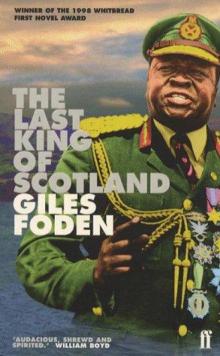 The Last King of Scotland (1998)
The Last King of Scotland (1998)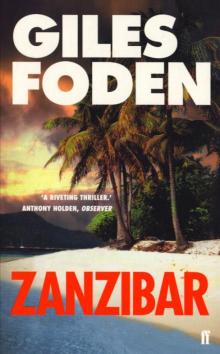 Zanzibar
Zanzibar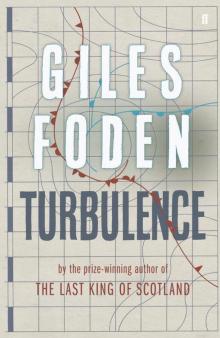 Turbulence
Turbulence The Last King of Scotland
The Last King of Scotland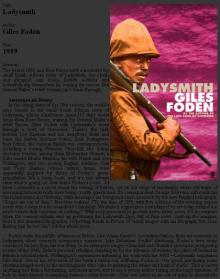 1999 - Ladysmith
1999 - Ladysmith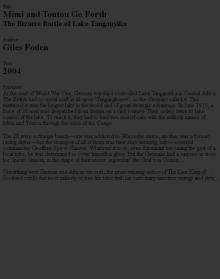 2004 - Mimi and Toutou Go Forth
2004 - Mimi and Toutou Go Forth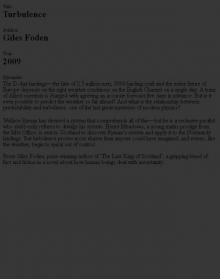 2009 - Turbulence
2009 - Turbulence